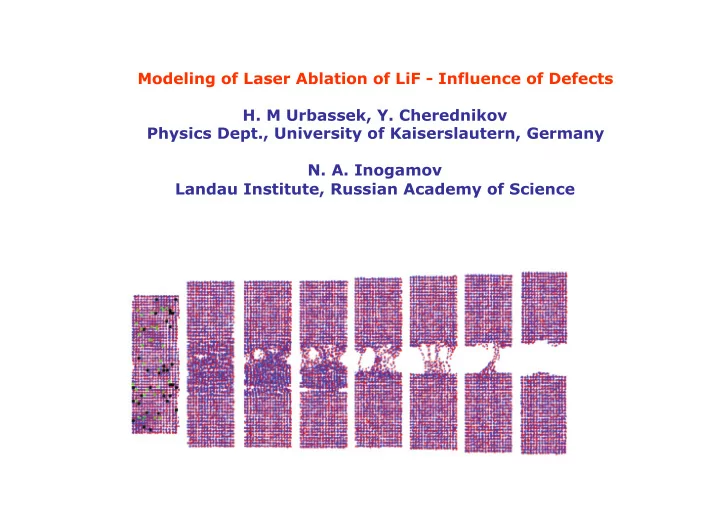

Modeling of Laser Ablation of LiF - Influence of Defects H. M Urbassek, Y. Cherednikov Physics Dept., University of Kaiserslautern, Germany N. A. Inogamov Landau Institute, Russian Academy of Science
Theoretical tools • Molecular dynamics Solve Newton ‘ s equations. Advantages: • Input: only interatomic forces, nowadays available for many materials • as realistic as possible - for many-body simulations - for thermal nonequilibrium situations • easy visualization / animation: appeals to imagination Disadvantages: • computationally slow • cannot handle time scales & 1 ns • cannot handle space scales & 100 nm Isaac Newton (1643 – 1727) [1 µ m] 1687: Philosophiae Naturalis Principia Mathematica
Outline • Two-temperature model / MD for metals • Two-temperature model / MD for LiF • Melting and spallation of thin LiF films • defects • swift-ion tracks in LiF
Two-temperature model + MD for metals: assumes electronic and atomic system to be internally thermalized with temperatures T_e, T_a heat conduction equation for electrons Newton ‘ s equations for atoms electron-ion coupling terms Schäfer, Urbassek, Zhigilei 2002
typical results for thin metal films: here: Al with increasing energy input E 0 = absorbed energy / atom melting ...
metal (Al) target melting spallation multi-fragmentation
Outline • Two-temperature model / MD for metals • Two-temperature model / MD for LiF • Melting and spallation of thin LiF films • defects • swift-ion tracks in LiF
System: LiF thin Film (10 nm) (100) surface lateral size X-ray pulse: 7 ps photon energy 90 eV
MD: Buckingham potential + dispersion forces V ij ð r Þ ¼ q i q j 4 πϵ 0 r þ A ij exp ð − r= λ ij Þ − C ij r 6 ; describes well: elastic constants yield strength melting temperature (T m = 1118 K) ...
cold curve (T=0)
LiF electron kinetics n e : electron density in conduction band Q(t): laser source ν imp : impact ionization κ rec : recombination E gap : gap energy Result: Electron concentration < 3 % Inogamov et al 2009
LiF electron kinetics n e : electron density in conduction band Q(t): laser source ν imp : impact ionization κ rec : recombination E gap : gap energy E e : electron energy in conduction band A: energy transfer in electron-atom collisions T e : electron temperature A = 1 / ps E e = n e E gap + E e , kin = n e E gap + 3 2 n e kT e Inogamov et al 2009
electron kinetics
Electron and atom temperatures after F= 30 mJ/cm 2
LiF coupling of electron kinetics and molecular dynamics
Outline • Two-temperature model / MD for metals • Two-temperature model / MD for LiF • Melting and spallation of thin LiF films • defects • swift-ion tracks in LiF Cherednikov et al., J. Opt. Soc. Am. B 28, 1817 (2011)
LiF snapshots after 50 ps 10 20 30 40 50 80 mJ/cm2
Synopsis:threshold energies for various material classes Absorbed energy / atom is scaled to melting temperature: E 0 /kT m
Outline • Two-temperature model / MD for metals • Two-temperature model / MD for LiF • Melting and spallation of thin LiF films • defects • swift-ion tracks in LiF Cherednikov et al., Phys Rev B 88, 134109 (2013)
Defects : neutral Li and F atoms F - -> F 0 + e - Li + + e - -> Li 0 Defects are introduced ad hoc
Potentials taken from quantum chemical calculations: Wang et al, Phys Rev B 68 (2003) 115409 Note: Li 0 is small -> may easily diffuse high polarizability -> attractive binding
Thermal ablation (no defects) defect-supported ablation (0.45% defects) F= 38 mJ / cm 2 F = 10 mJ / cm 2 Result: defects lower ablation threshold - bond weakening - tensile pressure due to smaller atom radii agrees with experiment
Green: Li cluster (metallic colloid) destabilizes lattice
Top view of defects: black: F 0 , green: Li 0 Formation of Li cluster by fast Li 0 diffusion Condensation heat -> ablation Experimentally observed under swift-particle irradiation of LiF
„Cold ablation“ Extreme case: assume that laser irradiation - produces no free electrons (no target heating) - only produces defects (potential energy) Here defect concentration 0.57%
Outline • Two-temperature model / MD for metals • Two-temperature model / MD for LiF • Melting and spallation of thin LiF films • defects • swift-ion tracks in LiF Cherednikov et al., Phys Rev B 87, 245424 (2013)
Swift ions deposit their energy in the form of electronic excitation in the target „Similar physics“ as in laser irradiation How to treat system in MD: After ion passage: F- -> F+ + 2e- in track cylinder Schiwietz et al 2004
Here: couple MD with a particle-in-cell (PIC) code for electron dynamics Equations for electrons: ρ = e ( Z i n i − n e ) ( charge density: ∇ 2 φ = − ρ electric potential: , ε 0 � e ( φ − φ 0 ) � number density: n e = n 0 exp k B T e
Electric potential: at passage of ion 10 fs later
number of electrons remaining in track shielding of F + ions
Evolution of ionization track: sputtering
Conclusions Two-temperature model for LiF: need for plasma equations for electron density and energy • Ablation mechanism similar as in metals: spallation in molten state • Role of longlived defects • Defects de-stabilize lattice -> lower ablation threshold • even „cold“ ablation is possible • role of metallic clusters: - form due to high Li 0 diffusion rate - destablilize lattice due to condensation heat • efficient: potential energy introduced by defects small compared to laser energy (or thermal energy of electrons) Cherednikov et al., J. Opt. Soc. Am. B 28, 1817 (2011) Cherednikov et al., Phys Rev B 88, 134109 (2013) Cherednikov et al., Phys Rev B 87, 245424 (2013)
Recommend
More recommend